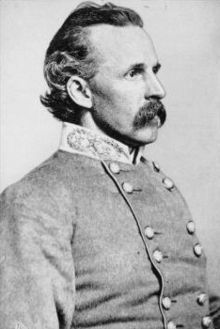Edward Lloyd Thomas
| Edward Lloyd Thomas | |
|---|---|

Edward L. Thomas
|
|
| Born |
March 23, 1825 Clarke County, Georgia |
| Died | March 8, 1898 (aged 72) McAlester, Oklahoma |
| Place of burial | Kiowa, Oklahoma |
| Allegiance |
|
| Service/branch |
|
| Years of service | 1847–48 (USA) 1861–65 (CSA) |
| Rank |
|
| Commands held |
Thomas's Brigade, ANV |
| Battles/wars | |
| Other work | planter, Land Bureau, Indian Bureau agent |
Mexican-American War
American Civil War
Edward Lloyd Thomas (March 23, 1825 – March 8, 1898) was a Confederate brigadier general of infantry during the American Civil War from the state of Georgia. He was colonel of the 35th Georgia Infantry Regiment, which was assigned to Joseph R. Anderson's brigade, which became part of A.P. Hill's famed "Light Division." When Anderson left to take control of the Tredegar Iron Works in Richmond, Thomas was promoted to brigadier general to command the brigade. He retained this position for the rest of the war and was present at all of the major battles of the Army of Northern Virginia
Thomas was a graduate of Oxford College of Emory University and served in the Mexican-American War. He was an uncle to famed American Old West lawman Heck Thomas who helped bring down the Doolin Dalton Gang.
Thomas was born in Clarke County, Georgia, to Edward Lloyd Thomas (surveyor) and Mary Hogue, the youngest of eleven children. He was a graduate of Oxford College of Emory University and served in the Mexican-American War from May 1847 until August 1848 as a second lieutenant in an independent company of Georgia mounted men. Before serving he farmed in Whitfield County, Georgia. Three of his brothers were Confederate officers: Henry Philip (b. 1810) a colonel in the 16th Regiment of Georgia was killed in battle at Fort Sanders in Knoxville, Tennessee, in 1863; Lovick Pierce Thomas, I (1812–1878) captain and quartermaster of the 35th Georgia Infantry resigned in 1863 due to injury; Wesley Wailes (1820–1906) served as a major in Phillip's Legion of Cavalry.
...
Wikipedia
